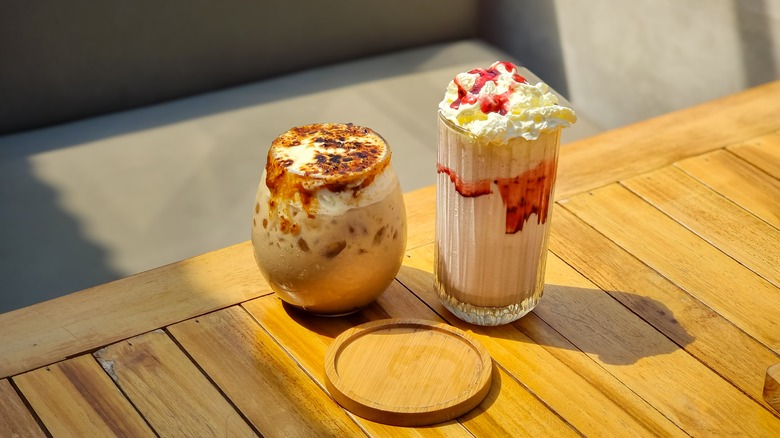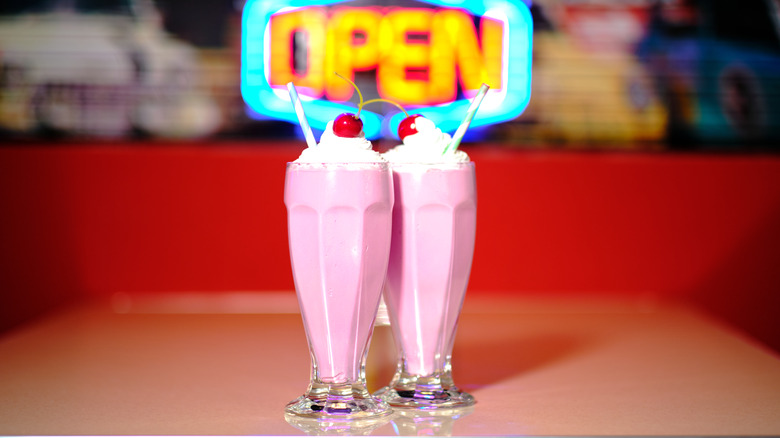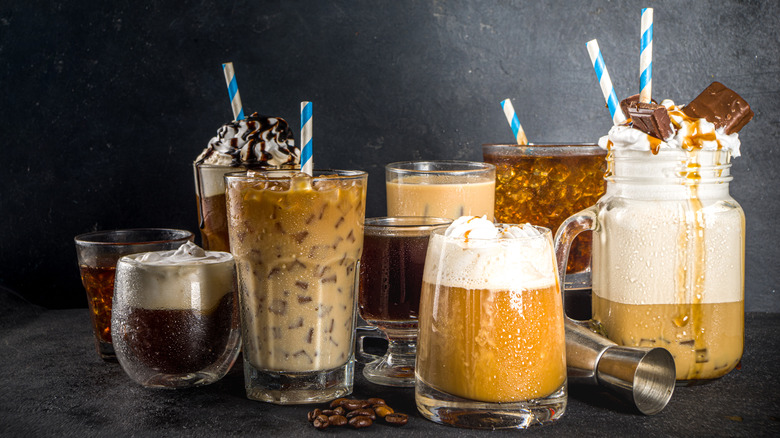Milkshakes Vs Frappes: Are They The Same Thing?
Milkshakes and frappes might seem easily distinguishable to some people, but the names are actually interchanged more often than you think. Ultimately, there are some big differences, and ordering the wrong one can end in a big (albeit still tasty) disappointment.
Milkshakes are thick, creamy cold beverages typically made up of ice cream, milk, and a flavoring agent. Their flavor will depend largely on the flavor of ice cream used, though many shakes use vanilla ice cream as their base and a flavored syrup to determine the main taste. Milkshakes are almost always blended, although you'd be surprised just how easy it is to make your own milkshake without a blender.
Frappes, on the other hand, are a mix of coffee, ice, milk, and a sweetening agent. The word itself, "frappe", is French and means "iced" or "chilled" owing to its texture. Structurally, frappes and milkshakes are very different. Frappes can be blended or shaken with ice cubes, so they will either be slushy in consistency or like an extra chilled iced coffee. In the case of shaken frappes, the vigorous motion of shaking the liquids with the ice results in a foamy, light consistency. A new addition to frappes is xanthan gum, a common food additive that binds the frappe ingredients together in a way that results in a smoother texture and prevents the coffee from separating from the ice.
The origins of milkshakes and frappes
Originally, back in the late 1800s, milkshakes were alcoholic and made from whiskey, cream, and eggs. As time went on, Walgreens started selling malted milk powder and this soon started to be incorporated into blended drinks of milk and a flavoring agent. The malted milk powder made the drink creamy and this version of a milkshake took over from the alcoholic original. Eventually, Ivar "Pop" Coulson, a Walgreens employee, added ice cream into the mix, and this became the prototype for the version of milkshakes we have today. Every development since has been one of automation, usually not recipe.
Frappes had an unlikely start at the 1957 Thessaloniki International Fair. An employee, unable to find hot water to make his coffee, took inspiration from a new Nescafe invention, and shook together his instant coffee, cold water, and some ice cubes. Voila — the first frappe as we know it. The new idea caught on and in the following decades, this simple shaken icy beverage exploded in popularity. It's funny that a drink with a French name is actually of Greek origin, but the drink really became international after the 2004 Olympics in Athens. Tourists quickly took to the beverage and the global demand rose from then on.
Variations on frappes and milkshakes
Almost every restaurant offers milkshakes, but you'll notice that there are some stark differences across establishments. Aside from the historical developments, there are many different styles and names. Famously, New England milkshakes are just that – shaken milk drinks, no ice cream in sight. To make matters more confusing, if you want to add ice cream, no problem, that'll just be a frappe to your local New England barista. Have no fear though, you can still discern between the frappe types by the pronunciation — "frap-pay" is the regular kind with ice, while "frap" refers to the ice cream drink.
Frappes also have variations, with Starbucks' Frappuccino becoming the main association for many people. Shaken frappes are still very popular in their home country of Greece, and locals have also since diversified the recipe. A new favorite (okay, new since 1993) is the Freddo Espresso, which has a distinctive foamy top. Frappes without coffee still count, as fruity frappes are a summer favorite — just get your favorite juice and blend or shake it up over some ice and milk.



